- Home
- Anne Rivers Siddons
Islands Page 18
Islands Read online
Page 18
“What happened with that?” I asked.
“Camilla,” he said. “There was no contest there.”
So on this last morning of the last century in the millennium, I flinched as if I had been bitten by a blackfly, and said, “Hi, Bunny. You’re up and at it early this morning.”
She wore a neon-pink velour top and pants, and her astonishing bosom jutted shelflike and absolutely immobile in front of her as she strode on the elliptical trainer. It was hard not to stare at it. She wore matching pink pom-poms on her white exercise shoes.
“I’ve got plans for later,” she said coyly. “I need to get started early. What about you all? Aren’t the Scrubs going somewhere exotic like Hawaii or the Riviera to see the millennium out?”
I thought that her notions of exotic did not exactly coincide with mine, and I hated the familiarity of “the Scrubs” on her lips. Nobody else I knew but Bunny ever called us that, except us.
“Exotic in the extreme,” I said. “Sullivan’s Island, to be exact.”
“Oh, yes, Camilla’s beach house. It must really be something special; I heard enough about it from Charlie over the years. I’ve never seen it. We always went to the Isle of Palms.”
I did not know who “we” was, and did not ask.
“Well, it’s not very special, I’m afraid, except to us. It’s practically falling apart. We all own it equally with Camilla now.”
I was immediately sorry I had told her that; it was no one’s business but ours. But something about the way “Camilla” also sounded on her lips put my back up; a sly sort of familiarity, maybe. I knew that Camilla would probably not even remember who Bunny Burford was.
She smiled broadly, her cheeks bunching up into tight little apples, and said, “How convenient for Camilla. Well, she always did know how to get what she wanted, even in kindergarten. I can remember her just standing and staring at a ball I was playing with, smiling and smiling, until I gave it to her. I never saw that smile fail. I’m surprised she hasn’t smiled somebody else into taking care of her since Charlie died.”
I felt cold rage spread in my chest, but would not give her the satisfaction of showing it.
“Camilla hardly needs taking care of,” I said. “She usually takes care of us.”
“Bet she does,” Bunny said, grinning fiercely. “Well, have the Scrubs got all their supplies laid in?”
“Supplies?”
“For Y2K,” she said as if to a backward child. “You know, water and food and kerosene for heating and cooking. Toilet paper, toothpaste. If the bridges go out, you all could be stuck over there for weeks.”
“Sounds wonderful,” I said. “I’ve always wanted to do that. What about you? Have you battened down?”
“Oh, yes,” she said complacently. “My friend and I have reservations at a lovely hotel in Asheville, and my car is already packed with everything you could possibly need for a long siege. My friend is even bringing his gun.”
“Gun?” I had a crazy image of Bunny stalking through the woods in all her massive pink fuzziness, gun at the ready in case some woodland creature was unlucky enough to show itself.
“We don’t anticipate needing it,” she said. “The hotel is very secure, and it’s a lot easier to defend yourself in the mountains. But we feel safer just having it. You never know who might break into your room in a power outage.”
True, I thought. It’s undoubtedly open season on room service waiters.
Aloud I said, “Well, good luck to you, Bunny. I hope you don’t have to use any of that stuff. And have a happy new whatever.”
“The same to you,” she said as I got off the treadmill and started for the shower. I wanted to get in and out and dressed again before she came into the locker room. Bunny Burford naked and pink and dripping was more than I could handle. I turned away so she could not see the laughter starting in my eyes.
“You all get your supplies in, you hear?” she called after me. “Better to be safe than sorry.”
“Right,” I called back over my shoulder. “I’m just on my way to pick up sandbags now.”
Before I got to the locker room I heard her say, “Sandbags?” in a worried voice. I was in the shower with the water roaring down on me before I allowed myself laughter.
In the car on our way over to the island, I told Lewis about my encounter with Bunny.
“She’s even more awful than I thought she was,” I said. “She actually implied that Camilla schemes and manipulates all the time, to get what she wants. I think Camilla took her ball in kindergarten, or something. Anyway, she’s never forgotten it.”
“She wouldn’t,” Lewis grinned. “Camilla is everything Bunny isn’t, and won’t ever be. By the way, did you know her name was Bernice, not Bunny? At any rate, she’s had a thing about Camilla ever since Charlie met her. Thinks Camilla stole him from her. I’ve never heard her say anything, but some of the nurses have, and it gets around. Nobody pays any attention to her.”
“I hope it never gets back to Camilla.”
“Why? She’d laugh her ass off. You know nothing much ever bothers Cam. Who’s the friend she’s taking to the mountains?”
“I don’t know, but he’s packing a gun.”
He winced. “So would I, if Bunny was my friend. What kind of supplies do you think they’re taking?”
“Oh, you know. Bottled water. Toilet paper. Dress shields.”
“Bad girl,” he said, grinning.
The sky was lowering when we reached the beach house, although the air was soft and there was a hint of some flowery fragrance in the air. Whether it was blooming on the island or borne in from far away on the tide, I could not tell. Except for Camilla’s old gray Mercedes, ours was the only car in the sandy parking space. There was an aluminum ramp now, up to the house, beside the steps. We had had it installed for Boy and Girl, who could no longer manage the stairs, and for Gladys.
“I use it sometimes, too,” Camilla said ruefully. “The four of us old crocks crawling up it must be something to see.”
We had all laughed. Camilla might be badly stooped now, but she was so ethereally lovely in her sixties that the word “crock” could not possibly apply. I was sure that she knew that.
We got out of the Range Rover and unloaded the back. Tonight was to be the feast of all our feasts. We had brought sherried she-crab bisque from Linda Cousins’s kitchen, and both duck and quail, courtesy of Robert. I had bought some silken, hideously expensive truffled pâté from O’Hara & Flynn. Henry and Fairlie were bringing rare-as-black-pearls white asparagus, which we would have with a caviar mayonnaise. Lila had stuffed an imperial crown pork roast and Simms was bringing champagne of a vintage that the rest of us would have had to mortgage our homes for. Camilla was making the dessert. She would not tell us what it was to be. Even though we had hauled food up these stairs hundreds of times, it was hard not to be excited about tonight’s dinner. Everything about the day and the night had the breath-held air of anticipation about it.
The turn of a century, the turn of a millennium…portent was everywhere. All of a sudden, midway up the stairs, I shivered, as if a goose had walked over my grave. I stopped and looked back at Lewis.
“What?” he said.
“This millennium thing feels like some kind of juggernaut bearing down on us,” I said. “I don’t want to live in a new millennium. I haven’t used up the old one yet.”
“Go on up before I drop this, my little Luddite,” Lewis said. “When we’re ninety the Post and Courier will hail us as the only generation to see the year and the century and the millennium turn. We’ll be interviewed incessantly.”
“You wish.”
From the outset, the night was Camilla’s. She met us at the door virtually shimmering with excitement, thrumming with a kind of palpable radiance. I had seen her happy before, and laughing, and exhilarated, but I had never seen her like this. You could almost see the dancing particles of light around her, feel her exuberance. We both smiled, and then laughed. It
was impossible not to.
“You look like somebody plugged you in,” Lewis said, kissing her on the cheek. “Share with the class.”
“Oh, I don’t know,” she said, hugging us both hard. “All of a sudden I just thought how many years we’ve all been together here, and how I’ve loved it, and how I’ve loved you both, and everybody, and how glad I am that it’s never changed.”
An answering wave of love for her and us and the house and the island swept over me, and I hugged her back, and spun her around. I was shorter by five inches, but she was as light as a bird’s wing, as a winged seedling borne down on the wind from a chestnut tree.
“Me, too,” I said, tears prickling behind my eyelids. “I can’t even imagine what all those years would have been like without you…without us. We’re like family. No, better than family, because we chose each other.”
“You know what Robert Frost said about family and home,” Camilla smiled. “He said, ‘It’s where, when you go there, they have to take you in.’ We’ve taken each other in through everything.”
“Till death do us part,” Lewis grinned, teasing her for her crazy delight.
“Till then,” she said, her eyes brimming, and I knew that she was serious. Somehow, the thought made me uneasy.
We had agreed for this one night to dress formally, over the groans from Lewis and Henry, and I went up to our bedroom and hung our evening clothes in the musty, mothy closet. Does anything else smell like a beach house closet? Out the window I could see scudding cloud shadows on the beach and water, and see the spartina bending down under the rising little wind. Little gusts of sand peppered the windowpane. Suddenly I was wild to be out on the beach to taste the wind, to let the blown sand sting and scour my face.
“Anybody want to go for a walk?” I said.
“Absolutely not,” Camilla said. “I’ve worked all afternoon on my hair.”
“Me, either,” Lewis said. “I’d join you in a nap, though. If we hurried up and slept fast, we could get in a couple of good hours.”
Even though he’d largely passed on his regular practice to young Philip Ware, he sometimes went in when a real surgical emergency presented itself, and one had last night. He’d been in the operating room at Queens until three. Most doctors I knew were chronically sleep deprived, and grabbed naps when and wherever they could.
“Go on and take one,” I said. “I won’t be long. I just want to take the last beach walk of the century. I’ll be back way before dark.”
“Take the dogs, will you?” Camilla called from the kitchen, where something smelled heavenly.
And so the two grumbling old Boykins and I went out into the stinging wind, and walked down the wooden steps to the beach.
It was colder on the beach than I had expected. The wind was straight out of the east, raw and smelling of dank, salty winter water. I scrunched my neck farther down into the cowl of my hooded sweatshirt, and jammed my hands into my pockets. We crossed the corrugated ripples where the tide cut ran when it was full, and went down to the hard-packed sand just above the tidal slick. The tide was going out. Frothy lips of dirty white foam receded toward the water. Here and there a broken shell or a rubbery, glistening tentacle of seaweed lay half buried. Sometimes in the winter the beach was studded with sea glass and shells and wonderful, twisted limbs and logs of driftwood, but today the beach was nearly empty, of both its artifacts and its people.
Boy and Girl sat down on the sand at the same time and gave me reproving looks. They refused to get up when I whistled to them, so reluctantly, I took a last look at the tossing green-gray sea and turned back toward the dunes and the house. Complacently, now that they had achieved their purpose, they gave me doggy grins and waddled ahead of me toward the steps.
I looked up at the house, thinking that it was the last time in this century that I would see it like this, looming like a light ship over the beach and the sea, just at twilight, with the windows glowing. As always, my heart lifted.
My eyes went past the house to the big dune to its left, and my heart gave a great, fishlike leap and then seemed to stop. There, on the dune line, just as I had seen it on the week before Hugo so long ago, was a figure cloaked in gray, looking down on me. I stood still. The dogs whined at me reproachfully.
Then the fading light shifted and the figure became Camilla, in her old gray raincoat, waving to me and calling something.
“Lewis and I are going for more ice,” she shouted through cupped hands. “Be back in a few minutes.”
I waved back, standing still for a moment while my heart slowed its thundering. Somehow I thought I could not have borne another omen.
By the time they came in with the ice, dark had fallen. I had had a quick shower and was upstairs dressing. I felt, for some reason, as breath-held and tremulous as a young girl before her first prom. It was not, of course, the first time we had all seen each other in evening dress, but it was the first time on this island, in this house. Why that was important, I could not have said, but it was.
“You up there?” Camilla called out from the kitchen below. “I could use a hand.”
“Yes,” I said. “I’m coming.”
I went slowly down the old staircase, trailing my fingers on the splintery banister, stepping over the perennially damp spot on the runner underneath the leak we had never had fixed. I took a deep breath, and then came all the way down into the living room.
“Holy shit,” Lewis breathed.
“Anny, you look absolutely glorious,” Camilla said.
I could feel myself, ridiculously, blushing.
The dress was black and fluid and long, thin-strapped and cut in a deep V in front and back. More of my modest, sun-speckled breasts showed than in anything else I had ever worn. I had bought it impulsively at Saks several years ago when they had marked almost everything down to nearly affordable, thinking that a plain black evening dress would probably last my lifetime and should come in handy one time or another. But in the intimate light of my own bedroom my breasts had seemed to protrude like overripe melons from the bodice, and the black silk cupped my ample behind like lascivious hands, and I had never worn it. But tonight it was just us….
In the past two or three years, a thick silver streak had appeared in my hair, running from part to ends as if it had been painted there. I secretly liked it, though I often said I knew that I looked like a skunk, because it was the only distinctive thing about my still-untamable thatch of curls. Tonight I wore a pair of silver earrings I had bought in Arizona, when I’d gone there to work in the remote Four Corners area with Lewis and Henry. The earrings were ornately scrolled and pierced, and hung halfway to my bare shoulders. They and a pair of excruciatingly painful black satin high-heeled sandals that I could not remember why I had bought were the only accessories. I had practically no jewelry, and had never really wanted any.
“Is it immoral to ravish your own wife on the stairs?” Lewis said.
“No, just uncomfortable,” Camilla said, laughing. “Go on upstairs and get dressed yourself, you goaty satyr. You’ve shot your chance for a nap.”
“Open the wine and pour us a glass, Anny,” she said as she followed him up the stairs. “And would you stick another log on the fire? No, wait, let Lewis do it when he comes down. Oh, and Fairlie called. Henry is stuck at the hospital with an emergency and will be here when he can. She’s coming on out. She’s furious with him.”
I rummaged in the drawer we called the thing drawer for a corkscrew, thinking that it was late in the game to get upset when your doctor husband had an emergency. By the time Camilla and Lewis came down, the wine was poured and waiting and I had set out the pâté and crackers and a bowl of the benne wafers that no Charleston cocktail party is ever without.
I drew in my breath when Camilla appeared. I had expected her usual silvery-gray chiffon or dull-green satin, but she was dressed in a long slide of crimson velvet, cut low and caught under her breasts with a diamond brooch that I knew had been her grandmother’s
, long sleeves that came to a point over her slender hands, and a diamond and ruby necklace that looked a part of some fabled crown jewels, under glass in a tower across the sea. Her copper-and-silver hair had been brushed until it flew around her face with electricity, and, like Camilla herself, seemed to give off sparks. She could have been a woman on a tapestry in a great castle. She seemed utterly archaic, utterly of another time. I had thought so many times before, but Camilla tonight was a medieval effigy come to life.
“Excuse me while I go upstairs and set fire to my dress,” I said. “It seems a shame to waste this on us.”
“I wouldn’t wear this except for us,” she said. “I’ve had this dress since I came out, and the necklace was my great-grandmother Charlebois’s. She’s supposed to have smuggled it out when the Huguenots fled the persecution, but I think she nicked it somewhere. What persecuted Huguenot ever had anything like this?”
A car’s tires scrunched in the driveway, and Lewis, looking scrubbed and correct in black tie, went to look out the kitchen window.
“Lila and Simms,” he said. “All dressed up, as my old mammy used to say, like mules in buggy harness.”
“You never had an old mammy,” Camilla snorted. “You were the only kid in Charleston who had a white nanny.”
“That never goes out of this house,” Lewis said, and went down to help Simms with the case of champagne.
Like many downtown men, Simms wore evening clothes as if he was born to them—which he was. No matter how paunchy or jowly he got, nor how often we saw him in salt-stained sailing clothes or his hideous old college madras bathing trunks, Simms in black tie was formidable, so right that you thought, on seeing him, “Well, of course.” Even Simms struggling through sand holding one end of a case of champagne was indisputably south of Broad.
How do they do that? I had wondered more than once.
Lila, picking her way through the sand in cobwebby silver sandals, looked, in the diffuse light from the old yellow outdoor bug light, as she must have looked on the night of her debut. Hers had been the St. Cecilia ball, I remembered, possible to you only if your father was a member of the society. She wore a simple white dress cut modestly at the neck, with cap sleeves and a princess waist, and her mother’s famous triple-strand pearls. Her hair was put up, and her earrings were modest pearls, and until she turned around, Lila Howard might have seemed a dove among peacocks. But in back, her dress was cut to the waist or perhaps even a bit below, and had a skirt slit to the knee. She was so thin that the knobs on her spine stood out in bas-relief, but somehow, I thought, an extra ounce of flesh would have looked gross. Lila, like Simms, looked exactly what she was. Somehow they drew the eye like a light in darkness.

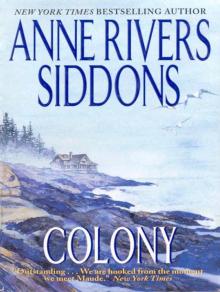 Colony
Colony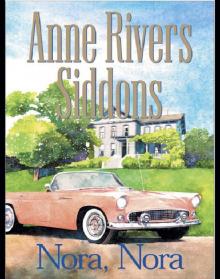 Nora, Nora
Nora, Nora House Next Door
House Next Door Homeplace
Homeplace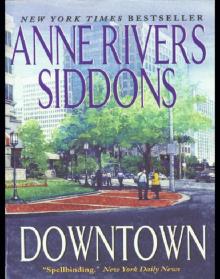 Downtown
Downtown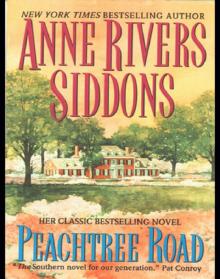 Peachtree Road
Peachtree Road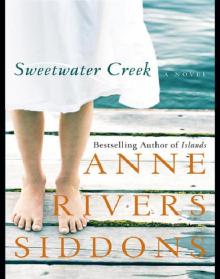 Sweetwater Creek
Sweetwater Creek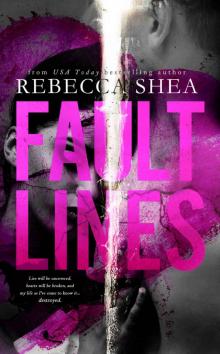 Fault Lines
Fault Lines Low Country
Low Country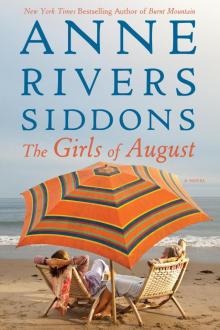 The Girls of August
The Girls of August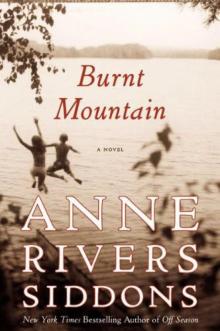 Burnt Mountain
Burnt Mountain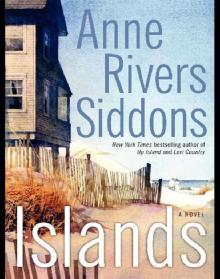 Islands
Islands